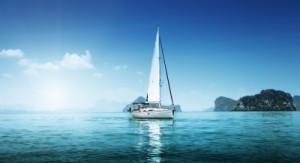 With each new generation you are seeing a more environmentally conscious population of people. This is also true for those in the boating world. There are things that boat owners can do to keep our rivers, lakes, and waterways clean and healthy.
With each new generation you are seeing a more environmentally conscious population of people. This is also true for those in the boating world. There are things that boat owners can do to keep our rivers, lakes, and waterways clean and healthy.
In shallow areas, boaters can shift it down to avoid disrupting the environment. Sediment affects the natural life cycle of plants and animals. Watch your wake. Boat wakes are known to erode shorelines and damage habitat. Be cognizant of where your anchor is tossed. There are things in shallow water that are environmentally sensitive.
Do not top off tank when fueling to minimalize the risk of fuel spills. Use absorbent pads to wipe up oil spills. Avoid the use of soaps to disperse fuel spills. Keep in mind, that this is illegal and only makes the problem worse. Keep your engine well-tuned for fuel efficiency. Repair oil and fuel leaks quickly. Remove all bilge oil. Use pumps or oil absorbent bilge pads to safely remove contaminated bilge water for proper disposal on shore. New products are available that can digest petroleum hydrocarbons in bilge water, but be aware that they take time to work. Flush winterizing agents and antifreeze from the engine before launching each season.
When refinishing your vessel over water, limit projects to less than 25 percent of the surface area of the deck and superstructures. Contain all debris with tarps and clean the work area regularly. For all hull work and larger refinishing projects, remove the vessel from the water and take it to a permitted boatyard. When painting or varnishing, guard against drips and spills. When cleaning your vessel, use plain water whenever possible and minimize your use of soaps or toxic materials when the vessel is in the water. Never scrub, scrape, or clean boat hulls on or near the water if covered with antifouling paint. Clean and prep boat hulls at permitted boatyards where the waste is properly contained.
Use onshore restrooms or carry a portable toilet. Larger vessels should have a Coast Guard approved marine sanitation device or marine head with a holding tank. Dispose of trash properly on shore and always recycle when possible. Minimize disposable plastic products brought on board. Fishing line, six-pack rings, and plastic bags are harmful to fish, birds, plants, and other wildlife, and they last for many years. They also tangle boat props, clog intakes, and litter shorelines. Whenever possible use environmentally friendly products on your boat. Be aware however that even these products can be harmful and concentrations should be minimized. Select non-toxic, phosphate-free, liquid detergents, biodegradable soaps, and non-acidic teak cleaner, to name just a few. Baking soda is an excellent non-toxic all-purpose cleaner.
Keeping our waterways, shores, and beaches clean will preserve their beauty for future generations to come. Thinking green on the water translates into bluer waters ahead.
Source: www.Boat.wa.gov – Green Boating.” Boat.wa.gov – Green Boating. Web. 15 May 2013.
Follow Us: Facebook – Foursquare – Twitter – YouTube – LinkedIn
